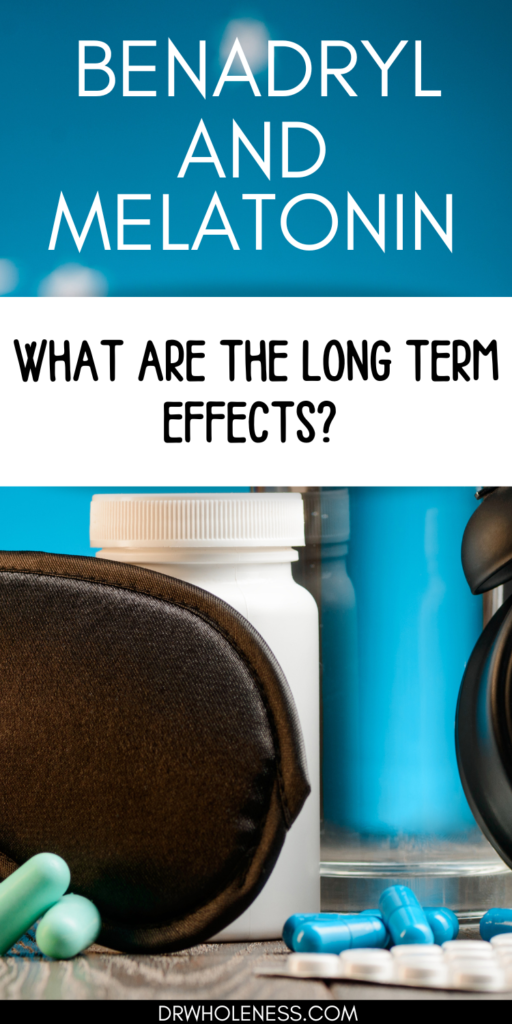Benadryl and Melatonin, it is paramount that we consider the long term consequences of consistent dosing with an artificial sleep aid vs a natural one. Melatonin signals to our bodies that it’s time to get ready for sleep (it does not induce sleep). Benadryl on the other hand, blocks the effects of histamine and acetylcholine, the main chemical in our brain that transmits information from one nerve cell to the next.
Both melatonin and Benadryl are available over the counter and have minimal direct financial cost but the long term implications of grabbing one versus the other are significant.
Dosing Limits for Benadryl and Melatonin
Melatonin does not have a known lethal dose. This doesn’t mean the more the merrier, but it does mean if you need something to aid in your sleep, going the melatonin route even at extreme doses is unlikely to affect you other than potentially being a little drowsy the following day.
In animals no lethal dose was found at dose equivalents in humans of 54,000mg. Most supplements are in the range of 1-5mg per dose. Benadryl does have a lethal dose at around 1000mg. This would be challenging to ingest unless you were bent on hurting yourself.
Benadryl, Melatonin and Cognitive Function
In comparing Benadryl to melatonin, they really move our bodies in the opposite direction long term. Benadryl is associated with reduced cognition and dementia. Whereas melatonin when deficient, promotes cognitive decline and when supplemented has shown to decrease delirium which is a precursor to dementia.
Melatonin has also been studied in the treatment of Alzheimer’s disease and in being protective against aluminum induced neurodegenerative disease. Aluminum is highly oxidative and destructive to nerve tissue. If you have had aluminum exposure or have tested high for aluminum, you may want to consider melatonin therapy.
The Effect of Sleep Aids on Muscle and Bone Mass
If you have been on this channel much, you know the value of maintain muscle and bone mass for vitality and longevity.
Melatonin on the other hand has data suggesting it is beneficial for preventing sarcopenia, which is a state of muscle wasting that is often a hallmark of aging and loss of strength.
And when I say aging, this process of deterioration is shown to kick in gear at age 40. This is another reason for each of us to consider our sleep habits, our use of blue lights emitting tablets and smart phones at night.
Since light and darkness are the main contributors to melatonin activity in the body, it is crucial that we take full advantage of our evenings and reduce our exposure wherever possible to the blue light spectrum.
As well as supporting muscle maintenance, melatonin is shown in animals and cell cultures to promote mineralization of bone and improve bone mass. Recent studies have also shown that melatonin when added to osteoporosis medications had a significant impact on savings in healthcare costs due to its beneficial effects on bone health by reducing the complications of bone disease.
On the Benadryl front, we have quite the opposite effect on muscle with the anti-histamine effects of Benadryl actually blocking blood flow and the beneficial inflammatory response created by exercised muscles. When the process of repair and blood flow are blunted, muscle damage and DOMS (delayed onset muscle soreness) are increased. This then leads to slower muscles adaptation and essentially more work for less benefit.
This is something we all want to consider when we choose the type of pill or tablet to support our current symptom picture. What is the long term effect of this decision?
For some natural sleep tips, check out the post, 10 Tips to Sleep Well.
Do you use a sleep aid? I’d love to hear about it in the comments below.

References:
- American Journal of Alzheimer’s Disease & Other Dementias®, Volume: 30 issue: 5, page(s): 439-447. Article first published online: January 22, 2015; Issue published: August 1, 2015.
- Esparza, J.L., Gómez, M. & Domingo, J.L. Role of Melatonin in Aluminum-Related Neurodegenerative Disorders: a Review. Biol Trace Elem Res 188, 60–67 (2019). https://doi.org/10.1007/s12011-018-1372-4
- Coto-Montes A, Boga JA, Tan DX, Reiter RJ. Melatonin as a Potential Agent in the Treatment of Sarcopenia. Int J Mol Sci. 2016 Oct 24;17(10):1771. doi: 10.3390/ijms17101771. PMID: 27783055; PMCID: PMC5085795.
- Bao T, Zeng L, Yang K, Li Y, Ren F, Zhang Y, Gao Z. Can Melatonin Improve the Osteopenia of Perimenopausal and Postmenopausal Women? A Meta-Analysis. Int J Endocrinol. 2019 Apr 7;2019:5151678. doi: 10.1155/2019/5151678. PMID: 31080477; PMCID: PMC6475537.
- Hutchinson, Alex. Do Antihistamines Increase or Decrease Muscle Soreness?Runner’s World, Aug. 23, 2016.

I had been taking 20 mg of melatonin and 50 mg of Benadryl for years and still had some problems with sleep. My doctor prescribed Zolpidem Tartrate (Ambien) 5 mg which I took with 20 mg of melatonin and 25 mg of Benadryl for 2 months, which helped me. But now my insurance won’t pay for Ambien. I’m a night owl and dread going to bed. I’m 80 and have had a heart rate of 130 for over 2 months, go in and out of A-Fib. Should I just increase my melatonin and hope for the best?
I have taking Melatonin 5mg and Benadryl 25mg for years and now having memory loss of 5 months to years in some situations. I can’t remember my health teacher in the 6th, seventh and eighth grades. I have lost my memory of 5 months in the early nineties. When I was young I did not take sleep meds but it might still be related to taking these meds.